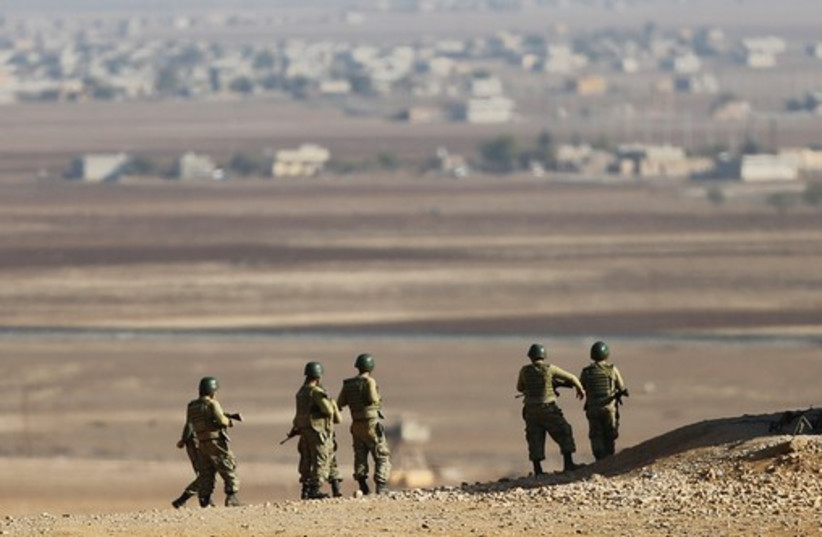Two major diplomatic rounds of talks may take place in the coming weeks. Saudi Arabia’s Foreign Minister Prince Faisal bin Farhan and his Iranian counterpart, Hossein Amir-Abdollahian, agreed to a meeting in the next week or weeks during Ramadan, according to a Monday report. At the same time, Turkish media reported that the deputy foreign ministers of Russia, Iran, Syria and Turkey may meet in “quadrilateral” talks soon, likely in early April.
The two initiatives are very important for the Middle East and its connections to major powers, like China and Russia. China helped to broker the Iran-Saudi reconciliation after years of Iran-Saudi talks in Iraq, a success that was seen as an important move for China and also as evidence of the weakening of the US position in the region.
Similarly, Russia has hosted talks between Iran and Turkey since 2016 – the Astana process, which was linked to the Syrian Civil War, but was also part of Russia’s agenda to remove the US from a role in Syria.

Iran intervened in Syria in 2012, Russia intervened in 2015 and Turkey intervened in 2016. The US also sent forces to Syria to fight ISIS in 2015. Recently Iranian-backed groups in Syria have carried out dozens of attacks on US forces in Syria. In total Iran’s proxies carried out 78 attacks in Iraq and Syria since January 2021.
Turkey has been urging the Syrian regime to reconcile with Damascus, since the Assad regime has already reconciled with several Gulf countries. Russia also wants Turkey and Syria to get along.
Turkey is heading towards elections in May and the Turkish ruling party AKP is afraid of being seen as having abandoned the Syrian rebels.
However, the ruling party is quietly urging Syrians to return to Syria in the wake of the massive earthquake in Turkey and Syria. Turkey’s defense chief has said that some 600,000 Syrians have returned – AKP would like to see more go back. Manby thousands of Syrians died in Turkey during the quake.
Push for more meetings at the defense level
Russia began pushing for more meetings at the defense level back in December between Syria and Turkey; it also hosted Turkey, Syria and Iran representatives this month, with Russian President Vladimir Putin hosting Syria’s Bashar al-Assad.
Russia, which is involved in the Ukraine war and is pushing nuclear sabre rattling regarding Europe, wants a diplomatic win for the Syrian regime.
Meanwhile, China and Iran also want a diplomatic win. Reports say that Saudi Prince Faisal bin Farhan and his Iranian counterpart, Hossein Amir-Abdollahian will meet in the wake of the China-brokered agreement on March 10 that saw the countries reconcile. “The two ministers also agreed to hold a bilateral meeting between them during the current month of Ramadan”, which ends in the third week of April, SPA in Riyadh said.
Daily Sabah reports that “quadrilateral talks between the deputy foreign ministers of Turkey, Russia, Iran and Syria may take place in Moscow in early April, Russian Deputy Foreign Minister Mikhail Bogdanov was quoted as saying on Monday by Russia’s state-owned news agency RIA.”
This comes amid a push in some Gulf media to portray Syria as emerging from the Syrian civil war as a state that the region needs to take more seriously. This could affect many issues in Syria such as how Iran uses Syria to threaten Israel and also how US forces are targeted in Syria.
The overall context then of these two meetings should be seen in a light that clearly brings more influence to Russia and China. China is showing it can help broker deals. Therefore the Iran-Saudi talks could bring major changes to the region. They could also fail and lead to no changes or have a mediocre impact on the region.
Either way, it comes in the context of the Gulf reconciling with the Syrian regime. Meanwhile the same Syrian regime is meeting with Iran, Russia and potentially with Turkey as Russia hosts those talks. It’s clear that in both instances the US is cut out of the process. Israel is also not part of either process.
This could mean that these rounds of talks both will impact Israel in the region and potentially empower Iran. Iran is part of both of these initiatives, reconciling with Saudi Arabia and being hosted by Russia. Iran is the region’s main adversary of Israel.
